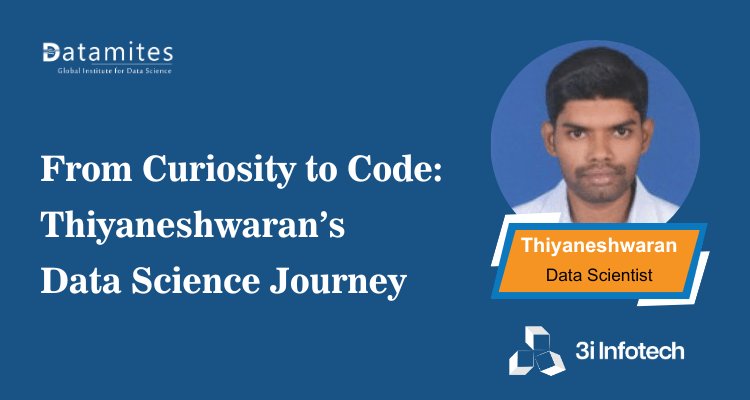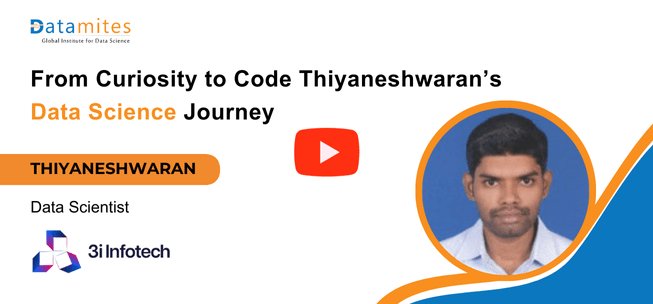From Curiosity to Code: Thiyaneshwaran’s Data Science Journey
Thiyaneshwaran’s story follows his leap from exploring ideas to building real solutions with data. It’s a snapshot of how curiosity evolved into a career in data science.

Switching careers is never easy, especially when you’re moving from a non-IT background into a highly technical role like data science. But for Thiyaneshwaran, a former mechanical engineering assistant professor, the leap from teaching and research into leading data science projects at 3i Infotech was not only possible, it was life-changing.
Thiyaneshwaran shares his learning journey, challenges, tools of the trade, and practical advice for aspiring data scientists. Whether you’re a beginner curious about the field or a professional eyeing a career shift, his story offers both inspiration and a clear roadmap, a perfect addition to those who watch DataMites success stories for motivation.
Thiyaneshwaran’s Successful Data Science Journey with DataMites Institute
Discover how Thiyaneshwaran transitioned from mechanical engineering to leading data science projects, building a growing career with the guidance of DataMites.
Q1: Can you tell us about your background before data science?
I was an assistant professor in mechanical and materials science engineering, also doing research work. My domain was completely different from IT. During the COVID period, I was looking for new opportunities when a friend introduced me to data science.
Q2: What inspired you to choose data science?
A friend told me about someone who completed a data science course and landed a job. I researched online, watched videos, and decided to give it a try, even though I had zero programming knowledge.
Q3: Did you have prior coding experience?
No. I started from scratch. At DataMites, I learned Python, libraries like Pandas, and later advanced concepts. Practice through coding tests helped me gain confidence.
Q4: How much did the training help in your interviews?
A lot. The explanations of core concepts, algorithms, and their mathematical foundations gave me the knowledge to answer technical questions during my first interview, which I cleared.
Q5: What kind of interview questions did you face?
They focused on algorithms, both traditional machine learning and deep learning. I was asked to explain how they work mathematically, loss functions, parameter optimization, and the reasoning behind model choices.
Q6: How important is programming in your current role?
It’s essential. From building and training models to deployment, you need Python or another programming language. In my case, Python is primary.
Q7: Do you work more on deep learning or machine learning?
Both, depending on the project. I’ve worked on deep learning–based forecasting models for sales predictions and big data analytics projects.
Q8: How important are big data technologies for learners?
It depends on the domain. In finance or anywhere with large transaction volumes, big data skills are crucial. Knowing SQL is also important, I use it around 30% of my time.
Q9: What does your day as a lead data scientist look like?
I design project architecture, assign tasks, decide tech stacks, and monitor progress. My work includes data collection, model building, and validation. Sometimes I generate synthetic datasets using Python.
Q10: Apart from technical skills, what soft skills are important?
Communication, presentation, and analytical skills are vital, especially if you interact with clients. You need to explain technical concepts clearly and manage expectations.
Q11: What advice do you have for beginners?
Upgrade your skills continuously. Learn in depth, not just at the surface level. Understand models mathematically, know where to apply them, and explore cloud platforms like AWS, GCP, or Azure. Learn deployment tools like Kubernetes or Docker.
Q12: How should someone start learning data science?
Begin with Python, then statistics, traditional machine learning, and deep learning. From there, explore deployment and specialization areas like NLP or computer vision. A structured course can help you follow the right path.
Q13: Should you specialize or learn everything?
Have basic knowledge of many areas but become an expert in one. Specialization makes you more valuable.
Q14: Is certification necessary?
It can help freshers but matters less for experienced professionals. Skills and practical knowledge weigh more.
Q15: How difficult is it for a mechanical engineer at 30 to become a data scientist?
Not hard if you commit. Start with Python, join a structured course, and practice daily.
Q16: How did you schedule your learning?
I studied 4–6 hours daily, including 2–3 hours of course time and self-study. Consistency was key.
Q17: Any tips for building a resume?
Highlight your tech stack, job roles, accomplishments, and keywords related to data science. Include projects and maintain a GitHub portfolio.
Refer to these articles:
- Breaking Into Data Science: Saif Ali Khan’s Journey
- Ruchi Goel’s Journey: From Career Break to Data Scientist
- From Commerce to Data Scientist: Arif’s Success Story
Insights from Thiyaneshwaran’s Journey to Becoming a Data Scientist
Discover how Thiyaneshwaran transitioned from mechanical engineering to data science and became a lead data scientist with the help of DataMites.
- Career shifts are possible at any stage: even non-IT professionals like mechanical engineers can become data scientists with the right training.
- Structured learning paths help beginners: starting with Python, then statistics, traditional ML, deep learning, and finally specialization areas.
- Mathematical understanding of algorithms is essential: knowing the logic, loss functions, and optimization behind models improves interview performance.
- Programming skills are critical: Python is the most used language in data science for building, training, and deploying models.
- Big data expertise is domain-specific: especially important in industries handling large transaction volumes like finance.
- SQL is still highly relevant: used regularly for database management in data science workflows.
- Soft skills matter: communication, presentation, and client management skills complement technical expertise.
- Specialization boosts value: while broad knowledge is good, being an expert in one field like NLP or computer vision sets you apart.
- Portfolios attract recruiters: GitHub projects, Kaggle competition participation, and well-documented work on LinkedIn help land interviews.
- Certifications help freshers but are less important for experienced professionals: practical knowledge is more valued.
- Consistent practice and learning are key: Thiyaneshwaran dedicated 4–6 hours daily to studying during his transition.
- Resume optimization matters: highlighting skills, tools, projects, and achievements increases job call-backs.
- Data analytics is a viable alternative path: focusing on SQL, Power BI, and other visualization tools.
- Continuous skill upgrades are mandatory: keeping pace with evolving tech like LLMs, generative AI, and cloud computing ensures long-term career growth.
Refer to these articles:
- How to Become a Data Scientist in Chennai
- Data Science Course Fee in Chennai
- How to become a Data Scientist in Coimbatore
- Data Science Course Fees in Coimbatore
Thiyaneshwaran’s story shows that determination, structured learning, and consistent practice can turn a complete beginner into a leader in data science. His path from teaching mechanical engineering to managing AI projects is proof that with the right mindset and guidance, career transitions into tech are within reach.
For aspiring data scientists, the lesson is clear: start small, learn deeply, build projects, and never stop upgrading your skills.
Data science continues to rank among the most popular IT courses today, and Thiyaneshwaran’s journey is a perfect example for both aspiring data scientists and professionals looking to transition into tech. Her experience underscores the importance of building a strong foundation and gaining hands-on experience. For anyone aiming to enter this field, consistency and a commitment to learning are essential to unlocking career opportunities in this fast-growing domain.
If Thiyaneshwaran’s success after a career break inspires you, now is the right time to upskill and make your move. Industry reports from IMARC Group predict that the global data science market will soar from USD 15.2 billion in 2024 to USD 144.9 billion by 2033, growing at a CAGR of 27.08%. With businesses generating unprecedented amounts of data, the demand for skilled professionals is only set to rise. Choosing a reputable training program that offers hands-on learning, real-time projects, and placement support can give you a decisive edge, especially when you enroll with a trusted data science institute in Chennai, Delhi, Bangalore, Hyderabad, Mumbai, Pune, Ahmedabad, or Coimbatore.
For those ready to take the leap, DataMites Institute stands out as a leading provider of training in data science, AI, ML, Python, and data analytics. Backed by globally recognized certifications from IABAC and NASSCOM FutureSkills, DataMites combines practical exposure, expert mentorship, and dedicated job assistance to prepare learners for success in the tech industry. With its career-focused curriculum, DataMites offers accessible, high-quality data science courses in Coimbatore, Pune, Bangalore, Hyderabad, Chennai, Ahmedabad, and Mumbai.

